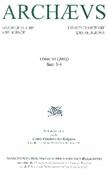The Unfolding of Truth Eunomius of Cyzicus and Gregory of Nyssa in Debate over Orthodoxy (360-381)
The Unfolding of Truth. Eunomius of Cyzicus and Gregory of Nyssa in Debate over Orthodoxy (360-381)
Author(s): Mihail NeamţuSubject(s): Comparative Studies of Religion
Published by: Romanian Assoc. for the History of Religions & Inst. for the History of Religions, Romanian Academy
Summary/Abstract: This study is a new attempt of reading the rich theological debates of the fourth century, which designed in different ways the Christian Creed of Nicaea (325) and Constantinople (381), focusing more especially the debate between the radical Arians (epitomized by Aetius and Eunomius) and the defenders of orthodoxy (represented at best by St Basil of Caesarea and St Gregory of Nyssa). By a short presentation of the struggle for orthodoxy during the forth century, I try to place St Gregory of Nyssa’s polemics with the radical Arians into a historical context. Subsequently, I pay attention to Aetius’ legacy in Eunomius’ works and biography, and their strong breaking points with the former tradition. The argument is carried on by a short presentation of Gregory’s explicit rejection of Eunomius’ theology. Consequently, I ponder upon the differences between the conflicting methodologies assumed by Eunomius and Gregory of Nyssa, respectively. The usage of rhetoric and dialectics for theological purposes is, in each case, highly significant. In contrast, I point out the importance of Basil and Gregory’s doctrinal and spiritual commitments, which I regard in continuity with the apostolic confession of Christ as ‘Lord and God’ (John 20: 24). I suggest that the Trinitarian controversy can be ultimately traced back to the most important question for the early Christian Church: the confession of Christ’s divinity and lordship. The present study also try to show that this confession is intimately related to the hermeneutical task of reading the Scriptures, which can always (and very easily) become an object of controversy when the ‘hypothesis’ of Christ’s natural sonship is lost on the way. Without this ‘hypothesis’, the texts of the Old and the New Testament were open to endless and polemical interpretations, and the borderline between ‘orthodoxy’ and ‘heresy’ is lost.
Journal: ARCHÆVS. Studies in the History of Religions
- Issue Year: VI/2002
- Issue No: 01-04
- Page Range: 69-120
- Page Count: 52
- Language: English
- Content File-PDF

